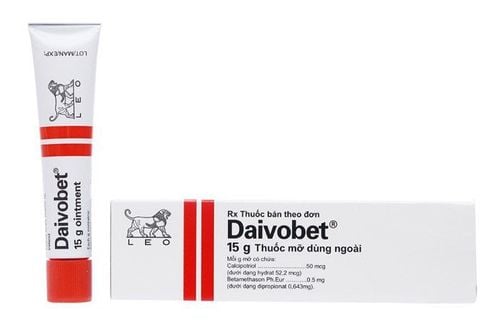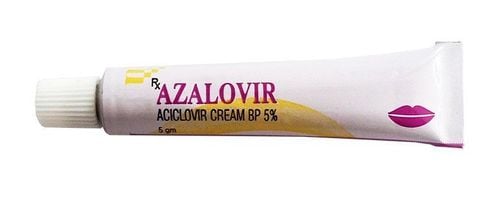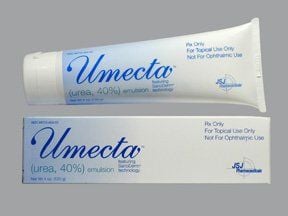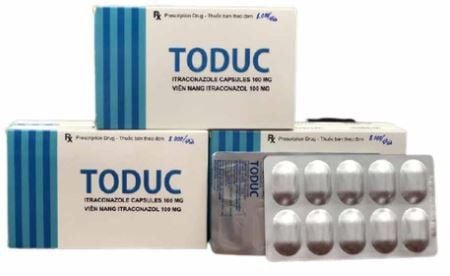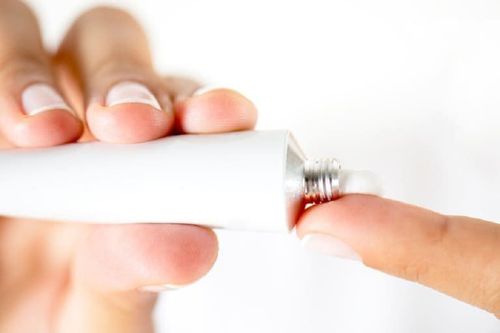This is an automatically translated article.
Betacream-GM belongs to the group of drugs that support the treatment of dermatological diseases and is formulated in the form of a topical cream. The specific use of the drug, please refer to the article below.
1. Uses and indications for using Betacream-GM
Betacream-GM drug contains the main ingredients Betamethasone valeat, Miconazole nitrate, Gentamicin. The drug is applied in the treatment of skin diseases, especially when there is evidence or suspicion of secondary bacterial or fungal infection. Some skin diseases using Betacream-GM such as: itchy papules, psoriasis (not for widespread psoriasis), eczema (eczema in children, discoid eczema and atopic eczema), seborrheic dermatitis oily skin, neurodermatitis, lichen simplex/flat, contact allergy, palmar and foot pustules, insect stings, progressive palmar keratosis, generalized acne seborrheic eczema.
2. Instructions for use and dosage of Betacream-GM
Drugs in the form of creams should be used by external application and should be applied in thin layers.
Suggested dosage to apply a thin layer of cream to the infected skin about 2 to 3 times per day. Maintain dose until skin improves. After the skin has improved, apply the drug once a day or less often.
3. Cases of contraindication to the use of Betacream-GM
Do not use for normal acne, dermatitis, rosacea around the mouth;
Skin lesions caused by primary bacterial or fungal infections;
Do not use for children under 1 year of age, including common dermatitis or diaper rash;
Do not use for inflamed skin in the outer ear because drugs containing gentamicin will be toxic to the ear;
Cases of hypersensitivity or allergy to all ingredients in the drug.
4. Notes when using Betacream-GM
There is a risk of major adrenal suppression, so long-term use is not recommended, especially in children and infants;
When used on the face, be careful if used for a long time;
Be careful when applying the medicine in the skin around the eyes, avoid getting the medicine into the eyes;
Careful monitoring is required when using the drug for severe discoid lupus, psoriasis, and eczema. When the infection is widespread, it is necessary to switch to systemic antibiotic treatment. In case of long-term fungal or bacterial infections, systemic drugs should be used;
There is no specific evidence of effects or harm to pregnant or lactating women, so it is not recommended to use the drug in unnecessary cases for these two subjects;
There is a risk of skin sensitization when applying the drug in a large area or for a long time;
The elderly or people with kidney failure applying drugs to a large area on the skin are at risk of ototoxicity,
Using many drugs may limit detection of infection;
5. Interaction of Betacream-GM with other drugs
Betacream-GM reduces the activity of Gentamicin: Mg, Ca, heparin, sulfafurazol, sulfacetamide, actinomycin, clindamycin, doxorubicin, chloramphenicol, acetylcysteine;
Do not use concomitantly with high doses and prolonged paracetamol because Betamethasone reacts with liver enzymes, increasing the risk of hepatotoxicity. Phenytoin, phenobarbitone, ephedrine or rifampicin may increase the metabolism of corticosteroids, reducing their therapeutic effect.
6. Undesirable effects of Betacream-GM
Causes local skin atrophy such as: dilatation of superficial blood vessels, thinning of the skin, skin cracks, especially skin covered with bandages or skin folds;
Change skin pigmentation and stimulate hair growth;
When used for a long time can cause adrenal insufficiency;
Do not arbitrarily stop taking medicine or are taking corticosteroids while treating psoriasis, because it will cause pustules of the disease.
In case of occurrence of side effects or suspected side effects, it is necessary to immediately notify the treating doctor for a reasonable solution and treatment.
Please dial HOTLINE for more information or register for an appointment HERE. Download MyVinmec app to make appointments faster and to manage your bookings easily.




